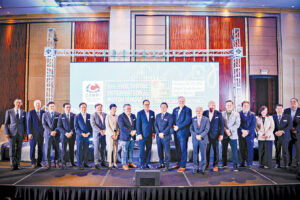THE CHAMBER of Automotive Manufacturers of the Philippines, Inc. (CAMPI), the country’s premier auto industry association, is gearing up for the 9th edition of its Philippine International Motor Show (PIMS). The theme of this year’s staging — the largest ever with a confirmed 17 brands participating — is “Dare. Drive. The Future Redefined.”
Said CAMPI President Atty. Rommel Gutierrez, “This year’s PIMS embodies CAMPI’s bold vision of uniting the automotive industry and leading the way in redefining advanced, inclusive mobility for all Filipinos. We are excited to showcase the innovations that will shape the future of transportation in the country.”
You could very well say that the second PIMS after the COVID-19 pandemic comes at a fortuitous time of growth for the industry. There is talk that total vehicle sales for the year might finally breach 500,000 — an all-time high. This aspiration isn’t new, said the CAMPI head, who’s also a Toyota Motor Philippines Corp. (TMP) executive. “The target of 500,000 units was actually first expressed 10 years ago. We’re confident that we’ll hit that, if not this year, then the next,” Atty. Gutierrez stated.
Based on CAMPI/TMA (Truck Manufacturers Association) YTD figures released for July, total vehicle sales stood at 265,610 units — 10.9% up versus the same period last year, when the two associations reported moving 239,501 units. From a month-on-month perspective, sales marginally grew by 0.6%. In an accompanying statement, Atty. Gutierrez had attributed the sales growth to “new product launches, improved product offerings, good sales momentum, as well as supply availability (that) helped neutralize the impact of Typhoon Carina, especially toward the latter part of July.” Commercial vehicle sales paced the tally with 194,812 units YTD — accounting for a massive 73% of the total. “(Today), we’re looking at many changes in the auto industry… We have never experienced such confidence in the CAMPI,” he added.
Along with changes in cars themselves, the automotive scene is evolving as well. That is certainly the case in the Philippines, where China-headquartered brands continue to stream in. Some are already CAMPI members, and more are expected to join the fold. Meanwhile, the business in local assembly is continuing to progress as well. Toyota has confirmed it will add the all-new Tamaraw to its CKD (completely knocked down) menu comprised of the Vios and Innova.
And the journey to increased motorization continues, of course. Atty. Gutierrez cited a present vehicle-to-population ratio of 35 automobiles for every 1,000 people in the Philippines. Compare this to Thailand which now boasts of more than 100 vehicles for every 1,000 people. There is still pretty sizeable gap left to cover if we base our mobility pervasiveness to this ASEAN neighbor.
Meanwhile, the electrification of transportation has truly begun in earnest here. As our new “Velocity” columnist Vince Socco reported recently (quoting CAMPI numbers), the consolidated sales for electrified vehicles — including both hybrids and battery electrics — reached 11,584 units last year. These automobiles accounted for 2.6% of total sales. This year (as of June), 9,238 electrified cars had already been sold — in turn accounting for 4.1% of the total.
Replying to a question from “Velocity” on the increase of electrified models, TMP President Masando Hashimoto said that, for Toyota, it really depends on the consumer. “We focus on B2C (business to consumer),” he declared, and explained that each market is different. He reiterated the car maker’s “multi-pathway” approach to carbon neutrality, insisting that “one size does not fit all.”
Mr. Hashimoto said that in the last 15 years since TMP introduced the Prius hybrid electric vehicle, Toyota and Lexus have sold some 18,000 units of electrified vehicles. From a lone Prius model in 2009, the two brands today have 14 hybrids and two full electrics — underscoring the global giant’s campaign for, yes, carbon neutrality.
Responding to the same question, United Asia Automotive Group, Inc. (UAAGI) Managing Director Froilan Dytianquin said that electrification is “something that we should already prepare for and accept.” Chinese brands, in particular, are moving to full electrification. “We believe that hybrids or electrified vehicles are really coming (in greater number) to the Philippines.” New energy vehicles are all the rage in China, and we’ve seen the level of advancement they have — expressed through not a few brands and their models here.
PIMS promises to be another exciting showcase of what lies just ahead — and what is here right now.
Regular members of CAMPI include Mahindra (Columbian Autocar Corp.); Daewoo (Columbian Manufacturing Corp.; Foton Motor Philippines, Inc.; Honda Cars Philippines, Inc.; Isuzu Philippines Corp.; Mitsubishi Motors Philippines Corp.; Nissan Philippines, Inc.; and Toyota Motor Philippines Corp. Associate members are Volkswagen (Automobile Central Enterprise, Inc.); Peugeot (BA Motors Philippines, Inc.); Kaicene (Berjaya Auto Asia, Inc.); Mazda (Bermaz Auto Philippines, Inc.); Ford Group Philippines, Inc.; Hyundai Motor Philippines, Inc.; Changan (IC Automotive, Inc.); Jaguar Land Rover (IC Land Automotive, Inc.); Mercedes-Benz, Chrysler, Dodge, Ram (IC Star Automotive, Inc.); Jetour Auto Philippines, Inc.; Kia (KP Motors Corp.); MG (SAIC Motor Philippines, Inc.); BMW (SMC Asia Car Distributor Corp.); Suzuki Philippines, Inc.; Chery (United Asia Automotive Group, Inc.); and Ferrari (Velocita Motors, Inc.).
CAMPI said that tickets for the 9th Philippine International Motor Show will soon be available. For more information, go to https://www.facebook.com/PIMS2022. BPI is the exclusive auto financing partner of the 9th PIMS.

















